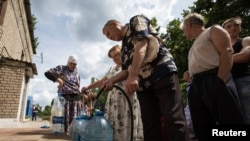GENEVA —
Armed separatists in eastern Ukraine have achieved nothing but the creation of a climate of insecurity which is ruining their own region, U.N. Human Rights Chief Navi Pillay said on Wednesday.
A 58-page U.N. report from her office, covering the period from May 7 to June 7, finds a significant deterioration of the human rights situation in the eastern regions of Donetsk and Luhansk.
The U.N.'s Gianni Magazzeni says armed groups who control those areas no longer respect any type of law and order.
“We are talking about a reign of fear if not a reign of terror in those pocket areas where armed groups can abduct, detain, conduct ill-treatment if not torture, sexual assault, intimidation, threats that would result in people so fearful for their life that they would not even want or dare to vote if they had a chance to do so or even to leave the area if they were in a position to do so,” Magazzeni said.
Armed groups in the regions of Donetsk and Luhansk should “stop taking themselves, and the people living in their regions, down this dead end, which is leading simply to misery, destruction, displacement and economic deprivation,” Pillay said.
“All they have achieved is a climate of insecurity and fear which is having a hugely detrimental impact on many thousands of people,” she said. “The time has come to put down the guns and talk. Peace and reconciliation, and long-term solutions are certainly attainable.”
The report says the self-proclaimed authorities acknowledge that, among their fighters, are citizens of the Russian Federation, including from Chechnya and other republics of the North Caucuses.
And the number of internally displaced people has increased. The U.N. refugee agency estimates there are about 34,000 IDPs in Ukraine, most from Crimea and about 15,000 in the Donetsk region.
U.N. monitors document 222 cases of abductions and detentions since April 13 in eastern Ukraine. Magazzeni says four abductees have been killed and 137 released.
“Among those released, we have been able to talk to them directly," he said. "That is where we have learned of the beatings, sleep deprivation, poor or inhumane conditions, instances of ill treatment, torture or more."
Freedom of expression continues to be threatened, particularly in the eastern regions. The report says journalists, 39 of whom have been abducted, face ongoing intimidation and threats to their physical security.
U.N. monitors report the situation for Pro-Ukrainian sympathizers in Crimea has worsened markedly since Russia annexed the peninsula in March.
The lack of law and order was undermining basic services such as education and water supplies in some of the impacted areas.
“Food soon may be an issue,” Magazzeni said.
Some information for this report provided by Reuters
A 58-page U.N. report from her office, covering the period from May 7 to June 7, finds a significant deterioration of the human rights situation in the eastern regions of Donetsk and Luhansk.
The U.N.'s Gianni Magazzeni says armed groups who control those areas no longer respect any type of law and order.
“We are talking about a reign of fear if not a reign of terror in those pocket areas where armed groups can abduct, detain, conduct ill-treatment if not torture, sexual assault, intimidation, threats that would result in people so fearful for their life that they would not even want or dare to vote if they had a chance to do so or even to leave the area if they were in a position to do so,” Magazzeni said.
Armed groups in the regions of Donetsk and Luhansk should “stop taking themselves, and the people living in their regions, down this dead end, which is leading simply to misery, destruction, displacement and economic deprivation,” Pillay said.
“All they have achieved is a climate of insecurity and fear which is having a hugely detrimental impact on many thousands of people,” she said. “The time has come to put down the guns and talk. Peace and reconciliation, and long-term solutions are certainly attainable.”
The report says the self-proclaimed authorities acknowledge that, among their fighters, are citizens of the Russian Federation, including from Chechnya and other republics of the North Caucuses.
And the number of internally displaced people has increased. The U.N. refugee agency estimates there are about 34,000 IDPs in Ukraine, most from Crimea and about 15,000 in the Donetsk region.
U.N. monitors document 222 cases of abductions and detentions since April 13 in eastern Ukraine. Magazzeni says four abductees have been killed and 137 released.
“Among those released, we have been able to talk to them directly," he said. "That is where we have learned of the beatings, sleep deprivation, poor or inhumane conditions, instances of ill treatment, torture or more."
Freedom of expression continues to be threatened, particularly in the eastern regions. The report says journalists, 39 of whom have been abducted, face ongoing intimidation and threats to their physical security.
U.N. monitors report the situation for Pro-Ukrainian sympathizers in Crimea has worsened markedly since Russia annexed the peninsula in March.
The lack of law and order was undermining basic services such as education and water supplies in some of the impacted areas.
“Food soon may be an issue,” Magazzeni said.
Some information for this report provided by Reuters




